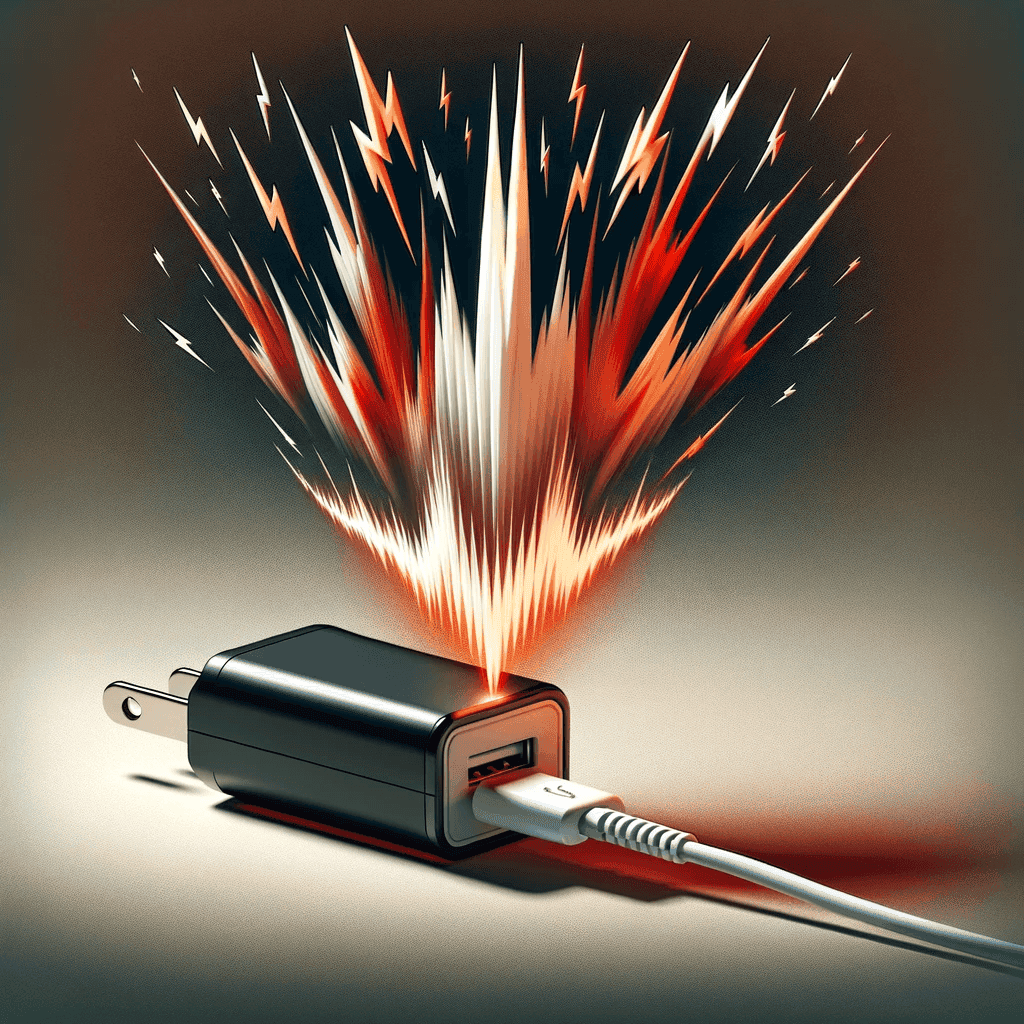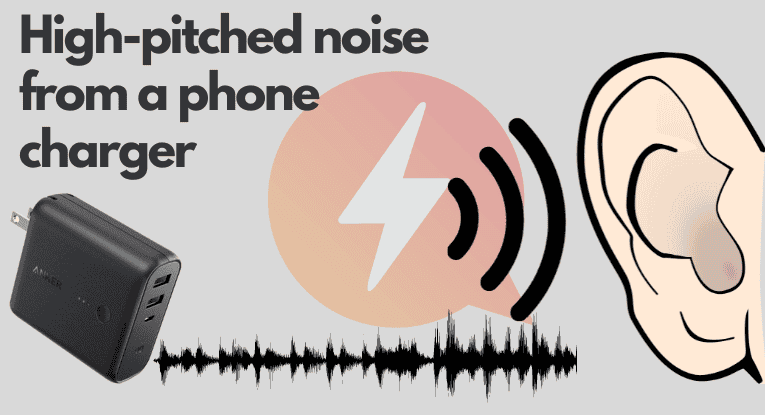
What is That High-pitched, Buzzing Noise Anyway?
Human hearing can process frequencies approximately within the range of 20Hz to 20,000Hz. In some scenarios, we can detect a high-pitched noise from a phone charger when the AC power is converted to DC power.

Phone chargers work using an electromagnetic coil as a transformer rather than an inductor. This results in the conversion of lower voltage power to DC in a diode bridge rectifier. Following this, power is channeled through the capacitor before being transmitted via the power cable. Each step in this process tends to generate some level of noise.
However, if you’re hearing a high-pitched sound, it’s probably coming from the transformer. This component generates noise when electricity flows into the coil, causing the transformer to vibrate and generate a resonating frequency.
Also, switch circuits in phone chargers can produce high-frequency sounds, such as a ticking noise, which can be somewhat bothersome.
EMI: The Invisible Culprit Behind Charger Noises
Electromagnetic Interference, or EMI, is a disturbance generated by an external source that affects an electrical circuit. It can lead to various issues, including the high-pitched noise commonly heard in phone chargers. EMI is essentially a clash of invisible electromagnetic waves with your charger’s internal components.
How Can EMI Cause Coil Whine?
When chargers convert AC power to DC power, the process can create electromagnetic fields. These fields sometimes interact with the charger’s own components, like inductors and transformers, causing them to vibrate. This vibration at specific frequencies manifests as the coil whine we hear.
EMI’s Impact on Charger Performance and Other Devices
While EMI in chargers usually results in harmless noise, it can sometimes lead to reduced efficiency or even data corruption in sensitive devices nearby. This is why managing EMI is crucial in electronic device design.
If you notice your charger making more noise when placed near certain devices, or if other devices malfunction when your charger is in use, EMI could be the culprit. In such cases, changing the charger’s location or investing in a higher-quality charger with better EMI management can resolve these issues.
A Common Phenomenon Across Electronics
Coil whine isn’t exclusive to phone chargers. This phenomenon is prevalent in many electronic devices, including computers, TVs, and even gaming consoles. Understanding its widespread nature helps contextualize coil whine as a common characteristic of modern electronics, not just a flaw in your charger.
Like phone chargers, other electronics experience coil whine due to vibrations in their electromagnetic components. For instance, in a computer’s power supply or a TV’s backlight inverter, fluctuations in current can cause tiny components to vibrate, producing a similar high-pitched sound.
Does Coil Whine Reduce the Lifespan of Affected Devices?
Many users often equate coil whine with a decrease in device longevity. However, it’s important to distinguish between normal operational noise and signs of wear or malfunction. Coil whine, in itself, is not a definitive indicator of a charger’s declining lifespan.
Generally, coil whine does not directly affect the performance or efficiency of a charger. A charger with coil whine can still deliver the correct voltage and current as efficiently as one without any noise.
The primary impact of coil whine is often psychological, affecting the user’s perception of the device’s quality rather than causing physical harm to the charger’s components.
When to Be Concerned
While consistent, low-level coil whine is typically harmless, a sudden increase in volume or changes in the sound’s nature might indicate other issues, such as a loose component or electrical malfunction, which could potentially affect the charger’s longevity.
Visible damage, overheating, or odors accompanying coil whine are more reliable indicators of potential problems that could shorten the life of your charger.
Troubleshooting: Tips to Prevent and Stop Coil Whine
While you might consider soundproofing your phone charger, it is not recommended. Soundproofing could cause the charger to overheat, which might damage the charger or even cause a fire. However, it’s important to remember that some noises are normal while others are not. Identifying the source of the noise could potentially help you eliminate it.
Inspect the Charger and Cable For Any Damage
Start by unplugging the charger from the wall outlet. Never inspect it before unplugging it to avoid the risk of electrocution. Once it’s unplugged, check the charger for any signs of damage, like a cracked casing. Damage might mean that the charger was dropped, affecting the internal components.
If there’s noticeable damage, you should replace the charger or take it to a repair shop. If the cable of the charger is damaged, you should replace that too. However, if everything seems in order, you can move to the next step.
Try a Different Outlet
Sometimes, the issue isn’t with the charger but with the power outlet. To test this, try connecting the charger to a different outlet. If the noise stops, your charger is likely fine. If it persists, you may need to buy a new one. Remember, the noise could be coming from the outlet, not the charger. If the outlet is buzzing, contact a local electrician immediately to prevent potential fire hazards or risks of electrocution.
Short Circuit
A short circuit happens when the electrical current travels through an unintended path, and the consequences can be severe. A fire could ignite from an electrical leak caused by a short circuit. This is why it’s critical to purchase high-quality phone chargers equipped with safety features such as short circuit protection.
Faulty Transformer
While transformers are often responsible for the noise, it is normal for them to produce some level of sound. However, this noise should decrease as your phone’s battery nears full charge, and should stop altogether when the battery is fully charged. If the noise doesn’t stop, it suggests a faulty transformer. Despite this issue, it is generally safe to continue using the charger.
Wireless Charger
Most modern wireless chargers come with a cooling fan due to the high heat they generate. If you’re hearing a high-pitched noise from your wireless charger, it could be the fan. Switching to a wired charger can solve this issue.
Stop Using a Worn-out Phone Charger
If your charger is a couple of years old and you hadn’t noticed any buzzing when it was new, it’s time to replace it. Components like diodes, capacitors, transformers, and rectifiers can loosen over years of use, leading to strange noises. If this applies to your charger, stop using it to prevent potential damage to your phone.
Never Buy a Low-quality Phone Charger
If you’re using a charger from an unknown brand or a counterfeit one, the high-pitched noise is probably due to the charger’s low-quality components. Buying fake or low-quality chargers not only increases the likelihood of early product failure but also poses a risk to your devices. It is therefore wise to invest in higher-quality products from trusted brands, even if they cost a bit more.
Is Coil Whine Dangerous?
Coil whine itself is not dangerous. It is a common occurrence in electrical devices and is typically more of a nuisance due to the noise it produces rather than a safety hazard.
However, it’s important to differentiate between coil whine and other types of noises that might indicate a more serious issue. For example, a buzzing sound, especially if it’s accompanied by a burning smell, overheating, or visible damage, could indicate a potentially dangerous electrical fault.
In summary, while coil whine is not dangerous, it’s always a good idea to monitor your electronic devices for any signs of malfunction, especially if the noises change, intensify, or are accompanied by other concerning symptoms.
